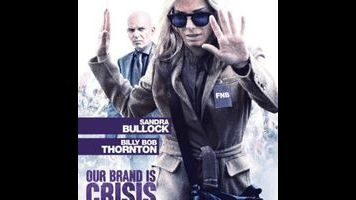
Fictionalizing non-fiction is a common practice; most films that purport to be “based on a true story” ought to slide a “loosely” in front of that boast of veracity. But there’s dramatic license, and then there’s taking real events that are plenty interesting on their lonesome and bending them into the shape of cliché. The political comedy Our Brand Is Crisis shares a setting, an area of interest, and maybe even an ultimate message with Rachel Boynton’s decade-old documentary of the same name, about a group of American strategists energizing a doomed presidential campaign in Bolivia circa 2002. This new Crisis sticks to the basic factual outline presented by the old one, but it also subs out the major candidates for fictional proxies and invents a brassy composite main character. By changing the names, the filmmakers are able to justify converting a ground-level portrait of electioneering—all backroom shoptalk and stump speeches—into a shamelessly commercial Sandra Bullock vehicle. It’s a makeover worthy of the vote vampires it ends up critiquing and lionizing.
Coaxed out of retirement to pitch in on a lost cause of a campaign, one-time master of spin “Calamity” Jane Bodine (Bullock) can’t seem to get her groove back. Her client, wealthy career politician Castillo (Joaquim De Almeida), is running for president of Bolivia, a position he won and then relinquished years earlier, and he’s down almost 30 points from the frontrunner, a fiery political upstart promising major change. Not liking the odds, Jane treats the first few days on assignment like a paid vacation, dozing off during strategy meetings and offering nothing but defeatist naysaying in the face of the team’s plan of attack. But just when it seems like she’s lost the will to fight, Jane discovers that the opposition is being coached by an old professional rival, the slickly amoral Pat Candy (Billy Bob Thornton), who’s bested her every time they’ve gone head to head. Suddenly, Jane has a personal stake in the election, and out comes a keen, mercenary instinct. She’s back, baby.
Our Brand Is Crisis, like its documentary inspiration, understands that the key to victory in Bolivia was reframing the election: Anyone who watched George W. Bush defeat John Kerry in 2004 will recognize Jane’s fear-mongering tactics, the way she sells Castillo’s unpopular years in office as the exact experience the country needs during a time of uncertainty and financial hardship. (Amping up the negativity, she makes “Things could get worse” into a winning slogan.) But Crisis is less interested in the nuts and bolts of siphoning votes than it is in the tenacity of its entirely fictional protagonist, who Bullock plays with the take-no-shit spunk that won her an Oscar for The Blind Side. The film fills out Castillo’s team with a first-rate ensemble of character actors—Anthony Mackie, Ann Dowd, Scoot McNairy, Zoe Kazan—only to reduce them to glorified cheerleaders for our heroine. And it treats the complicated moves and countermoves of a major election as fodder for a broadly comic grudge match, with scenes that wouldn’t have felt out of place in The Campaign, like Jane mooning Pat during a ridiculous bus race or Pat arranging to have a beloved llama run over during the filming of a Castillo spot.
All of this labored nuttiness is orchestrated by David Gordon Green, wildly uneven director of Southern-fried mood pieces (Joe, All The Real Girls) and lowbrow stoner yukfests (Pineapple Express, Your Highness) alike. Here, Green disappears deeper than he ever has before into workmanlike competence; the only personal signature is a funky, slow-mo dance party, which the filmmaker somehow manages to insert into every movie he makes. A comeback story that becomes an underdog fable, only to belatedly settle on a half-assed redemption arc, Our Brand Is Crisis feels closer in spirit to a Jason Reitman joint: Like, say, Thank You For Smoking, it’s the kind of movie that wants you to simultaneously enjoy and condemn the devious tactics of its protagonist, rooting for her to triumph while feeling scornful of how she might. Haunted by a dark chapter from her political past, Jane is torn between winning at any cost and listening to her nagging conscience, embodied by a bright-eyed, idealistic young volunteer (Reynaldo Pacheco) straight out of a screenwriting manual. That the film finds a way for Jane to have her cake and eat it too is apropos: When it comes to slick and cynical crowd-pleasing, Washington has nothing on Hollywood.